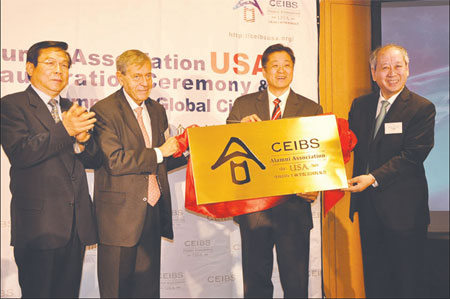Experts advise CEOs on how to make it in the US, globally
Updated: 2013-07-29 11:11
By Zhang Yuwei in New York (China Daily)
|
||||||||
|
From left: Wang Qingjian, director of CEIBS Alumni Relations Department; Pedro Nueno, president and Chengwei Ventures Chair Professor of Entrepreneurship at CEIBS; Solomon Cai, president of US alumni association of CEIBS; and Zhang Weijiong, vice-president and co-dean at CEIBS celebrated the inaugural ceremony of the school's US alumni association in New York on Sunday. Zhang Yuwei / China Daily |
Good business strategy and the skills to mingle in American business circles - including participation in charity events that help raise social awareness - will help Chinese investors further conquer the US market, or so advised a group of leading business experts during the launch of the US Alumni Association of the China Europe International Business School (CEIBS) on Sunday.
At a forum discussion on how Chinese companies can better become global citizens with Chinese foreign direct investment in overseas markets on the rise, experts said that Chinese CEOs' global vision was the key to success.
"A good business model is global," said Pedro Nueno, president and professor of entrepreneurship at CEIBS.
"Be humble and have a lot of respect (for the business partners in the US)," Nueno told the audience of about 100, mostly CEIBS alumni who have investments in the US or plan to.
CEIBS was established in Shanghai in 1994 and is the only Asian business school to achieve an international ranking for its MBA, EMBA, and Executive Education programs. It has some 12,600 members of its alumni associations in 13 countries, including the UK, France, Canada and Ghana.
CEIBS set up the new alumni association in New York to help provide a platform for Chinese business executives to share information and build networks - something that is currently lacking in the US despite the increasing volume of investment from China, said Solomon Cai, president of the US alumni association.
"You see the growing investment from China and the big US market, but it lacks a solid platform which can gather the Chinese business leaders here to interact and network," said Cai, who heads Globelink China Investment Ltd, a company that provides logistics supply chain solutions and services for international investment and trade.
Chinese investment in the US totaled $6.7 billion last year, according to Rhodium Group, a consulting firm that tracks overseas Chinese investment.
But the increasing volume is also coupled with some challenges for further success for Chinese investors to become "global citizens" as they expand on the global level, including mature branding and building visibility of their companies, said Richard Edelman, president and CEO Edelman public relations.
"There is a lack of brand awareness - other than Haier and Lenovo - we don't know many other Chinese brands," said Edelman, adding that there is also "low visibility" among Chinese CEOs.
"Everybody knows Jack Ma [founder of Alibaba], but beyond Jack Ma and Yang Yuanqing [CEO of Lenovo], it's a bit of an open space," said Edelman.
"In the next phase, the smart companies will start to adapt some part of a more visible CEO, more focusing on creating the brand on a global level and on sustainability for a supply chain," Edelman added.
Chinese companies' visibility is increased through broadening its investment portfolio. In recent years, Chinese investors have expanded their investment portfolios from traditional industries such as automobile and technology to new fields like real estate in the US.
Both the West and East coasts are popular destinations for Chinese investors for real-estate investments. Last month, Tishman Speyer and China's Vanke - the world's largest developer - broke ground on a joint luxury condominium project in San Francisco.
Chinese investors have also been eyeing New York's real estate market. Zhang Xin, CEO of Soho China, recently paid about $1 billion for a 40 percent stake in Manhattan's iconic General Motors building.
A short time later, China's Wanda Group, which owns AMC Theaters, said it would invest $1 billion to build a five-star hotel in New York City.
As the US housing market experienced a downturn in the past 15 years, its gradual recovery has presented opportunities for investors, including the Chinese, who are now the No 3 largest home owners in the US - after Americans and Canadians.
"Most US real estate remains undervalued, and it's showing signs of growth, so new investors have the chance to get in on the ground floor," said Jack Rosen, chairman of Rosen Partners, a New York Real Estate firm.
The US welcomes Chinese investors because they can help with the financing, which is what's most needed for most real estate projects in the US, Rosen added.
yuweizhang@chinadailyusa.com
(China Daily USA 07/29/2013 page1)
Most Viewed
Editor's Picks

|

|

|

|

|

|
Today's Top News
Experts advise CEOs on how to make it in the US
Israeli-Palestinian peace talks to resume
Latest US-China talks should smooth the way
Audit targets local government debt
30 people killed in Italy coach accident
Brain drain may be world's worst
Industry cuts cloth to measure up to buyers' needs
Reckless projects undermine the prosperity hopes
US Weekly

|

|
















